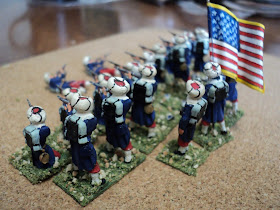'Losing one glove is certainly painful,
but nothing compared to the pain
of losing one glove, throwing away the other,
and finding the first one again' (Piet Hein)
Well, this posting is not about gloves, nor about Piet Hein, but about something I had thought lost long ago. Fossicking through my accumulated Wargames bits of paper, I discovered, to my joy, this!
 |
| Cover page set up for my ACW rule set. The name 'Bluebellies and Greybacks' was added later. |
This was to be the cover page for my hand written rule set (still attached: nine leaves of foolscap. both sides, and with marginal notes and amendments). But it was this picture that I missed most (dated early 1989 - 26 years ago).
From four years more recent (i.e. 1992), the following is part of a map that was to be used for a 'Second American Civil War' set in the state of Tennessee. This was a multi-player thing, and several actions were fought, with varying results. But I did make two very bad mistakes with the thing. First, I wanted to play as well as run it. That's OK for a two or three player game, but we had more participants here. It didn't really work. The other was that I allowed the thing to begin before I was quite ready. In the event, the largest armies met, I think at Shelbyville and the campaign bogged down. After a bit of a contretemps with one of the players for reasons I no longer recall I got fed up with the thing and closed it down.
 |
| Page 1 of my 6-page map of Tennessee, the theatre of the Second American Civil War. |
But I kept the map!
The idea was that after the disaster to Schofield's Corps at Spring Hill and Thomas's Army subsequently at Franklin, the Federal election campaign, which had seemed to be favouring Abraham Lincoln, turned sharply in favour of his rival Gen. McClellan. The increasingly bitter campaign was fought out amid a storm of criticism of the President and his favourite generals. After one of the most closely contested elections in all American history, McClellan was sworn into Office in January 1865. By this time an armistice had already been signed, and hostilities suspended.
Heated attitudes remained, however. Apart from the slavery issue remaining unresolved and an even sorer point than before, there was the matter of the territorial settlement. The Confederacy insisted upon the return of Missouri, North Arkansas, East and West Tennessee, West Virginia, and added, rather gratuitously, a demand for New Mexico, Kentucky and Maryland as well. That was far beyond the price for Peace even President McClellan was prepared to pay; much less would he for a moment entertain the idea of 'returning contrabands' that the Jeff Davis led government was arrogant and naive enough to insert into their list of demands.
Generals Lee and Cleburne led the CS Army's warnings that the talks would fail in the face of Davis's uncompromising attitude. They expressed no surprise at all when the Union armies refused, pending a Treaty ratified by Congress, to yield one inch from the advanced they had reached by the War's end. Lee resigned in disgust; Cleburne accepted with relief a posting in Galveston, Tx; other well-known generals also found expression of their distaste for a renewal of hostilities in various ways. Never known for his patience, Davis nevertheless began rebuilding the Army of Tennessee. Negotiations having stalled by the end of February, 1865, Richmond severed relations with Washington a month later.
On 1 April 1865, the Army of Tennessee left its Mississippi and Georgian cantonments, and marched north. The Second Civil War had begun.























